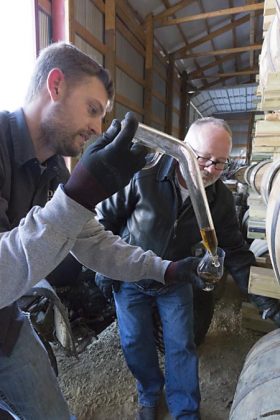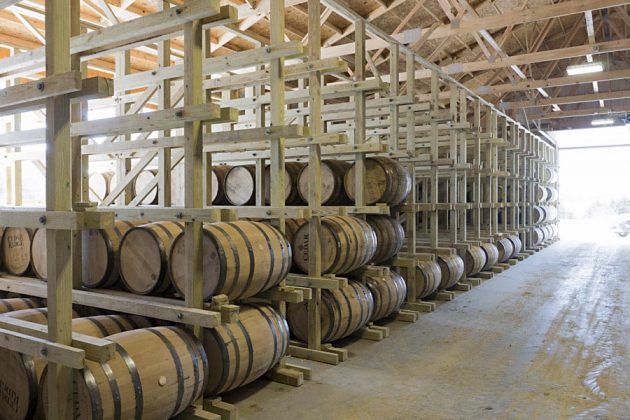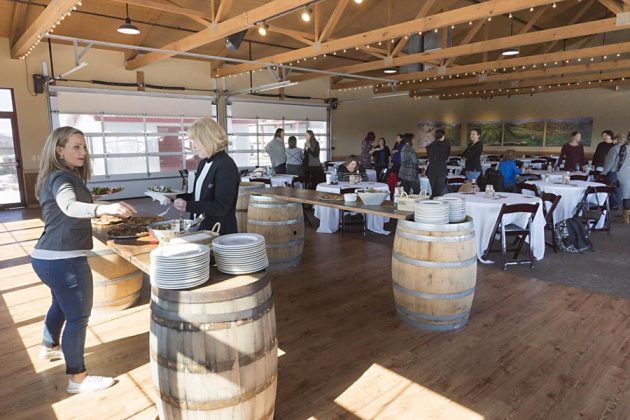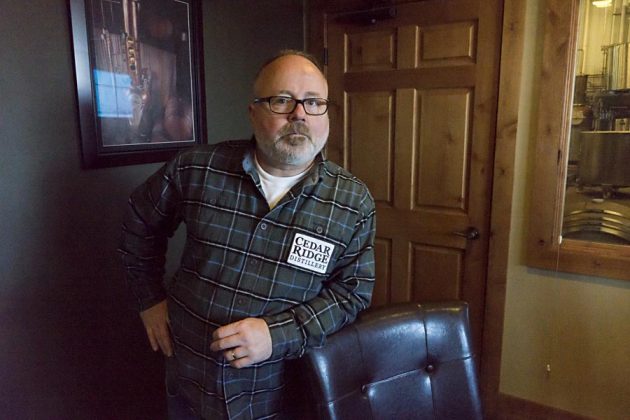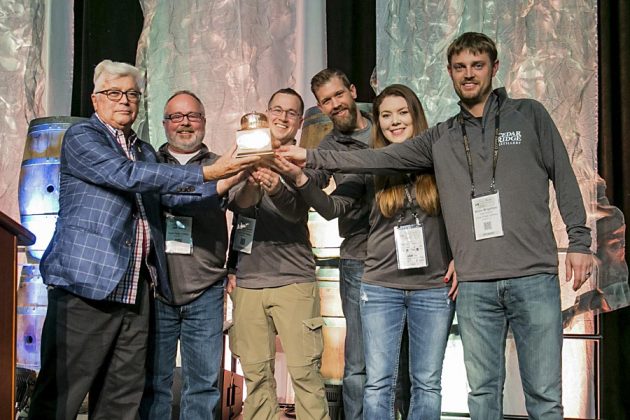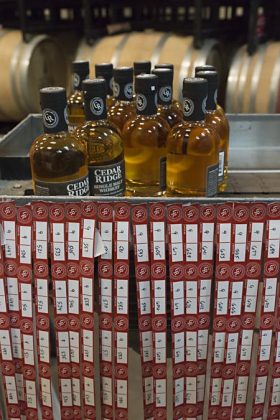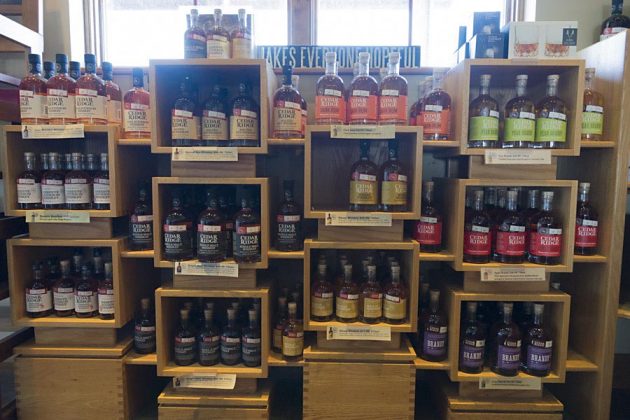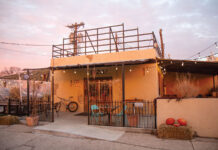In 2005, Jeff Quint opened Iowa’s first grain-to-glass distillery with a 35-gallon Christian Carl still. “It was all the still I could afford at the time,” said Quint. “I remember our TTB field agent coming in to do an audit, letting me know I could never make any money with that one little still. He may have been right.” However, over the past 12 years Quint has been able to successfully diversify his business, increase his production capacity and aging stock, hire more employees and take steps to mitigate the environmental impact of his production without taking on outside investors.
Quint grew up on a farm about 45 minutes north of the distillery in Winthrop, Iowa, and his wife Laurie lived on a farm only a couple miles away. Laurie’s family has been working the 800-acre Aljumekaal Farm for three generations. Together they have four children, and their two oldest sons, Murphy and Nolan, work in the family business; Laurie is the office manager. Murphy is their wholesale business director, and Nolan is a warehouseman. The family farm grows 400 acres of corn, and the distillery consumes only a small fraction of the approximately 70,000 bushels produced annually. Cedar Ridge trucks in the corn 900 bushels at a time.
“The corn used in our bourbon is 100% from our farm,” said Quint. Cedar Ridge procures the other grains needed for their whiskeys — malt, rye and wheat — from North Dakota via Cargill.
Not long after opening, Quint ran into the problem of having so much local demand he could sell every drop he made. However, selling every drop does not leave room for long-term growth or ability to lay down stock to age. “It took me a while to realize that, in the whiskey business, you must plan out your production and sales many years in advance and then commit to never selling more than your plan,” said Quint. After reaching a minimum level of profitability, Quint began using a small surplus to focus on production and putting barrels aside to age.
“Our production team is, right now, fulfilling our projected sales needs three to five years out, while our sales team is selling our production from three years ago,” said Quint. “There’s really no other way to do this over the long term, if you wish to grow.”
By adding a 200-gallon Carl stripping still and a 100-gallon Carl finishing still, Cedar Ridge is now able to produce four barrels of whiskey a day running two shifts, six days a week. The distillery produced the equivalent of 50,000 nine-liter cases of whiskey while selling only 15,000 in 2016. For 2017, Quint plans to increase his production to 60,000 cases and sales to 20,000 cases. Cedar Ridge has ordered an 800-gallon Carl still, which Quint plans to bring online in 2018. To handle the increased production they plan to build two additional rickhouses to store 6,000 total barrels. This additional capacity will give them the storage necessary to support expansion into more states and select export markets.
“We’re growing about as fast as we can afford to grow, without involving outside equity,” said Quint.
Producing 50,000 to 60,000 nine-liter cases of whiskey a year produces a significant amount of waste. Coming from families with deep roots in Iowa farming, Jeff and Laurie are also concerned about how their distilling impacts the land around them. Quint uses a lautering system for all of their grain spirits so their stillage is very low in total suspended solids, but the liquid stillage has a high biochemical oxygen demand. To reduce the environmental impact from their effluent, Cedar Ridge created the Sustainable Stillage Reclamation Project, which consists of thousands of plants and a series of bioswales (channels) and weirs (gates) that allows the water to re-oxygenate as it passes along the stream. The plants are able to draw on the available nutrients, and the stream stabilizes the oxygen demand so there isn’t a bloom in bacteria and microorganisms. Spent grain from the distillery feeds 160 pigs on a nearby farm.
At the time of starting the distillery, Quint also built a winery, which expanded to include a restaurant and event space. Winemaking is in Quint’s blood, as his great-grandfather Johann Quint emigrated from the Mosel wine region in Germany to Iowa in 1881. A prominent winery in Wintrich, Germany, Weingut Quint, still bears the family name.
The Cedar Ridge Winery & Distillery is situated on 17 scenic acres of land about midway along the corridor between Cedar Rapids and Iowa City. From atop a small rise, the distillery overlooks 10 acres of terraced grapes, which supply juice for about 25% of their annual wine production of 8,000 cases. A little more than half of the wine is sold at the distillery, while the rest goes to Iowa state stores. The winery adds about $1 million in revenue, while the restaurant and event center add another cool million, funding a lot of the expansion and barrels laid down. Diversifying their revenue streams and creating a destination has helped Cedar Ridge bring in approximately 60,000 visitors a year off the nearby interstate and increased its overall profitability. The events calendar includes live music on Friday nights, and a Blues and Bourbon Festival in July.
Cedar Ridge currently employs 45 people with 30 full-time equivalents, with seasonal fluctuations. And while Quint has high expectations for his employees, he is also willing to reward them. Three of his longest-serving employees—General Manager Jamie Siefken, Head Distiller and Production Manager Kolin Brighton and Wholesale Business Director Murphy Quint—have been given stock appreciation rights. Quint says this aligns their goals with his own: creating value in the company. If Cedar Ridge is ever sold, or continues to grow, these stock appreciation rights will allow them to share in the company’s financial success.
Thankfully, the State of Iowa recently allowed craft distillers to create additional revenue streams. This April, Governor Terry Branstad signed HF 607 that allows licensed craft distilleries to serve cocktails with the alcohol they make and increase their maximum annual sales to 100,000 proof gallons a year. Prior to this, Cedar Ridge could only give free on-site tastings of their distilled spirits and sell two bottles per customer for off-premise consumption. The bottle limit has now been raised to nine per customer per visit.
Despite these benefits for craft distillers, state and federal excise taxes are still the single largest operating expense, costing $11 per bottle. Since Iowa is a control state, all the spirits Cedar Ridge sells must go through the state Alcohol Beverage Division, including those sold out of their gift shop. The spirits are trucked to a warehouse in Cedar Rapids and dropped off, selling it to the state for $18 a bottle, payment for which they will receive in a month. The driver then walks around to the front to pay $27 a bottle, plus a one-dollar per case handling fee, before pulling the truck up to the dock again to pick up the spirits. Cedar Ridge then sells this bottle in their gift shop for $35.
Jeff and Laurie Quint have created a model company for the industry. Cedar Ridge is a growing craft distillery that is systematic about their long-term planning, makes use of local agriculture, is thoughtful about the environmental impact of their company, has created multiple revenue streams and created dozens of new jobs. These are some of the reasons ADI has chosen Cedar Ridge Winery & Distillery to win the 2017 Bubble Cap Award for Distillery of the Year. Congratulations!

